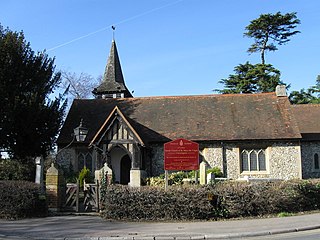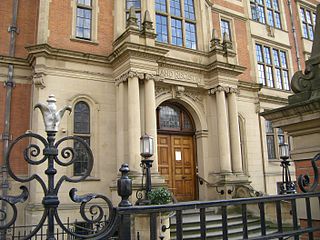Related Research Articles
A lien is a form of security interest granted over an item of property to secure the payment of a debt or performance of some other obligation. The owner of the property, who grants the lien, is referred to as the lienee and the person who has the benefit of the lien is referred to as the lienor or lien holder.

A constructive trust is an equitable remedy imposed by a court to benefit a party that has been wrongfully deprived of its rights due to either a person obtaining or holding a legal property right which they should not possess due to unjust enrichment or interference, or due to a breach of fiduciary duty, which is intercausative with unjust enrichment and/or property interference. It is a type of implied trust.

Stack v Dowden [2007] UKHL 17 is a leading English property law case from the House of Lords case concerning the division of interests in family property after the breakdown of a cohabitation relationship.

Lloyds Bank plc v Rosset[1990] UKHL 14 is an English land law, trusts law and matrimonial law case. It specifically deals with the translation into money of physical contributions from a cohabitee or spouse, under which its principles have been largely superseded.

Gissing v Gissing [1970] UKHL 3 is an English land law and trust law case dealing with constructive trusts arising in relationships between married couple. It may no longer represent good law, since the decisions of Stack v Dowden and Jones v Kernott.

DHN Food Distributors Ltd v Tower Hamlets London Borough Council [1976] 1 WLR 852 is a UK company law case where, on the basis that a company should be compensated for loss of its business under a compulsory acquisition order, a group was recognised as a single economic entity. It stands as a liberal example of when UK courts may lift the veil of incorporation of a company.

Merritt v Merritt [1970] EWCA Civ 6 is an English contract law case, on the matter of creating legal relations. While under the principles laid out in Balfour v Balfour, domestic agreements between spouses are rarely legally enforceable, this principle was rebutted where two spouses who formed an agreement over their matrimonial home were not on good terms.

Street v Mountford[1985] UKHL 4 is an English land law case from the House of Lords. It set out principles to determine whether someone who occupied a property had a tenancy, or only a licence. This mattered for the purpose of statutory tenant rights to a reasonable rent, and had a wider significance as a lease had "proprietary" status and would bind third parties.

City of London Building Society v Flegg[1987] UKHL 6 is an English land law case decided in the House of Lords on the relationship between potential overriding interests and the concept of overreaching.

Hussey v Palmer [1972] EWCA Civ 1 is an English trusts law case of the Court of Appeal. It concerned the equitable remedy of constructive trusts. It invokes the equitable maxim, "equity regards the substance and not the form."

Errington v Wood[1951] EWCA Civ 2 is an English contract law and English land law judicial decision of the Court of Appeal concerning agreement and the right to specific performance of an assurance that is relied on.

English land law is the law of real property in England and Wales. Because of its heavy historical and social significance, land is usually seen as the most important part of English property law. Ownership of land has its roots in the feudal system established by William the Conqueror after 1066, and with a gradually diminishing aristocratic presence, now sees a large number of owners playing in an active market for real estate. The modern law's sources derive from the old courts of common law and equity, along with legislation such as the Law of Property Act 1925, the Settled Land Act 1925, the Land Charges Act 1972, the Trusts of Land and Appointment of Trustees Act 1996 and the Land Registration Act 2002. At its core, English land law involves the acquisition, content and priority of rights and obligations among people with interests in land. Having a property right in land, as opposed to a contractual or some other personal right, matters because it creates privileges over other people's claims, particularly if the land is sold on, the possessor goes insolvent, or when claiming various remedies, like specific performance, in court.

Jones v Kernott [2011] UKSC 53 is a decision by the UK Supreme Court concerning the beneficial entitlement to a co-owned family home under a constructive trust. The court ruled there was a 90:10 split of ownership in favour of the main child-caring partner who contributed 80% of the equity to the home in which she lived. The non-resident partner had also ceased to pay bills and maintenance for the children for a considerable time.
Midland Bank plc v Cooke [1995] is an English land law case, concerning constructive trusts; and at first instance proven undue influence in law as to a secured business loan and later refinance.

National Provincial Bank Ltd v Ainsworth [1965] is an English land law and family law case, concerning the quality of a person's interest in a home when people live together, as well as licenses in land.

Binions v Evans[1972] EWCA Civ 6 is an English land law and English trusts law case, concerning a constructive trust of land which will often be irrevocable whilst the occupier is in occupation as opposed to a licence to occupy — and/or a tenancy at will which is similar save that without transfer of the underlying property it can be revoked without cause. The case hinged on the fact there was an agreement specifying the existing occupier was to remain.

Registered land in English law accounts for around 88 per cent of the total land mass. Since 1925, English land law has required that proprietary interests in land be registered, except in cases where it is necessary to protect social or family interests that cannot reasonably be expected to be registered. English law also runs a parallel system for around 12 per cent of land that remains unregistered.

Thompson v Foy[2009] EWHC 1076 (Ch) is an English land law case concerning the right of a person with an overriding interest in a home and deals with a family arrangement for a house to be a gift transferring from a mother to a daughter and the trust between the two parties that the daughter would pay the mother her sum to buy out her share of the property.

Geary v Rankine[2012] EWCA Civ 555 is an English land law case, concerning constructive trusts, and the establishment of a beneficial interest in an enterprise between a business owner and his or her lover and co-worker. It specifically concerned a case where the latter person received no formal wages and had entered no formal ownership nor partnership agreement nor directly or indirectly contributed in money to the purchase price.

CIBC Mortgages plc v Pitt[1993] UKHL 7 is a decision of the House of Lords relating to undue influence. The decision confirmed that a person did not need to suffer "manifest disadvantage" under a transaction in order to challenge it for actual undue influence.